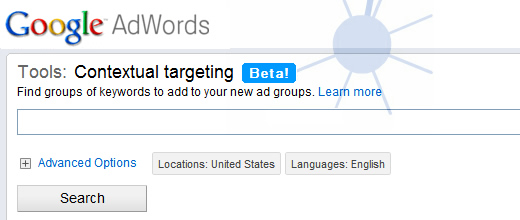
Keyword research is a critical component to a solid and rounded SEO strategy. When you break it down, you need to know what people are searching for in order to target the right terms. Keyword research fuels your content generation strategy. I use a wide range of tools when conducting keyword research and each has its own purpose. In the past, one of my favorite free tools was Google’s Wonder Wheel. You’ll notice the word “was” in the last sentence. That’s because Google shut down the tool last year, while many search engine marketers screamed a collective “NO!!” while it was happening.
Many people in the industry used Wonder Wheel to visually find related keywords, which often helped expand your keyword research (down the right path based on data). Wonder Wheel’s related terms were based on Google data (same session searches), so you knew the terms being displayed made sense. Also, the visual nature of wonder wheel made it very interactive and easy to use, while returning a smart path for search engine marketers performing keyword research.
As you clicked a word, related terms appeared around that term. As you clicked related terms, it became the anchor word, with more terms appearing around it. So on and so forth. It was a phenomenal way to find related keywords in an interactive and visual way. Needless to say, we all missed the Wonder Wheel.
An example of using Google Wonder Wheel to find related searches:
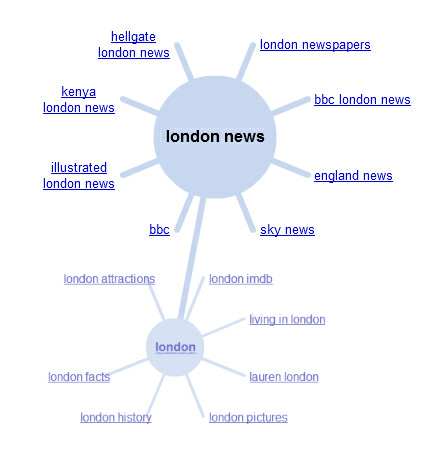
Image from Tech Source
Alternatives, and Confirmation at the Google Agency Summit
I had the opportunity to attend the Google Agency Summit last week in New York City at Google Headquarters. It was a great day packed with presentations covering the latest in Mobile, Video, Analytics, Social, etc. One of the first presentations was by Jordan Rost covering some of the free research tools that Google provides for marketers. As Jordan was covering Google Correlate, I asked if it could be used in a similar way to the old Google Wonder Wheel. He shot me a quick look and said, “Not exactly, but I’m getting to the Wonder Wheel soon.” Needless to say, I was excited to learn more!
The Contextual Targeting Tool
I do a lot of paid search work, so I’m extremely familiar with the Contextual Targeting Tool (CTT). But it seems the CTT contains a surprise that many search marketers don’t know about. Sure, it was often listed as an alternative to Wonder Wheel, but was it a solid replacement? Does it provide the same great same session data we were getting from Wonder Wheel?
Well, Jordan explained that the Contextual Targeting Tool is run by the same engine that fueled Wonder Wheel. Note, I’m not referring to a similar type of engine. It’s the exact engine that ran the Wonder Wheel! That’s awesome news, and it was great to receive confirmation of this.
Sure, it’s not as visual as Wonder Wheel, but it can still yield the same results. So, I’m going to walk you through a quick example of finding related terms by using the Contextual Targeting Tool below. Again, the purpose of Wonder Wheel was to find related terms, based on actual Google data. Let’s dig in.
An example of using the Contextual Targeting Tool in place of Wonder Wheel:
Let’s say you focused on computer security and you were just beginning keyword research. You know several keywords and categories you want to target, but want to find related terms, based on Google’s wealth of data. That’s a smart move, since you don’t want to leave keywords (and targeted traffic) on the table.
Let’s head over to the Contextual Targeting Tool to do some research.
1. Log into AdWords, click the Tools and Analysis tab, and then select Contextual Targeting Tool. Note, the primary purpose of the tool is to help search engine marketers build tight themes of keywords for Display Network campaigns. But, we’re going to use it as a replacement for the Wonder Wheel in this example.
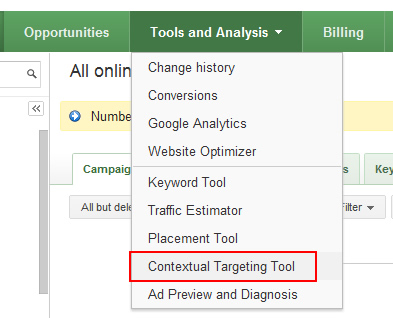
2. In the text field at the top of the page, enter “computer security” without quotes.
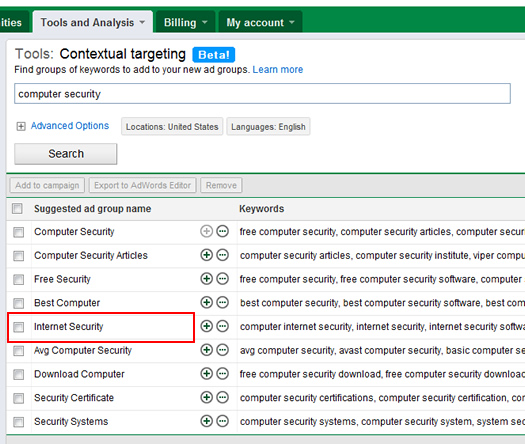
The CTT will display several rows of data containing related keywords, based on the initial keyword you entered. You will see the anchor keyword on the left and then five related keywords in each row. This is where you can start to gain great ideas for related terms. Again, these keyword grouping are being driven by the Wonder Wheel engine.
2. In our example, I see “internet security”. Maybe I didn’t know people were searching for that keyword, in addition to “computer security”, and I want to use that term as our keyword anchor (to find more related searches). When I enter that term in the text field, I now get more rows of data, based on that new keyword.
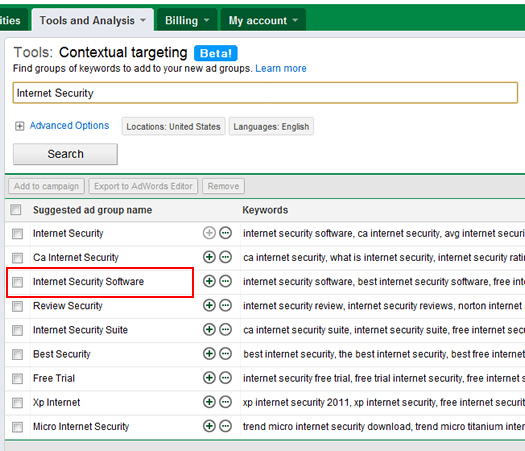
3. I now see “internet security software” in the list, and decide to use that as my anchor. I enter that word in the text field and I now see more terms related to this specific keyword, including “security rating”. Interesting… I wasn’t going to focus on that while building out content. Let’s go down that path now…
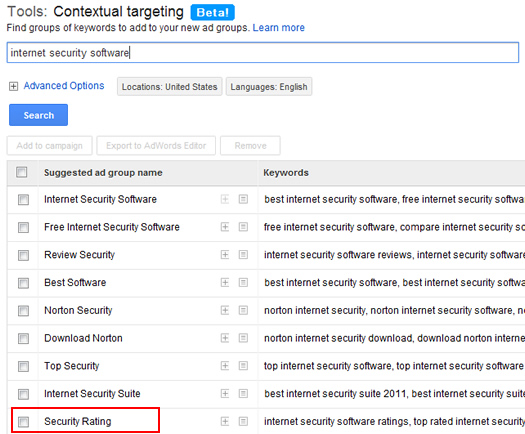
4. You can also click the plus sign (+) to expand a certain category, which will reveal additional rows with related keywords.
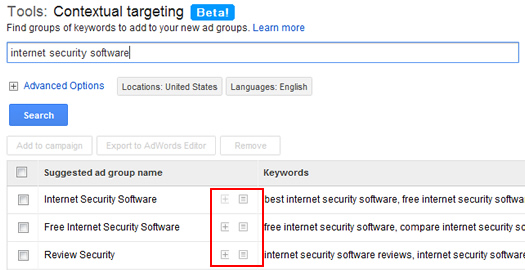
Valuable and Addictive
You can see how this can become both valuable and addictive. :) Sure, this isn’t as visual as Wonder Wheel, and it takes a few extra steps, but the data is the same. To me, running through this exercise is an essential component to performing thorough keyword research.
Let’s face it, you won’t know every keyword that people are searching for. Actually, many people are too close to their own industries, products, and services to know how the average person is searching. Using Wonder Wheel, I mean the Contextual Targeting Tool, you can find some gems that you might never uncover normally. That’s why I love this functionality.
Summary – Long Live Wonder Wheel!
Again, this is the same engine that fueled Wonder Wheel, and that’s confirmed by Google. So, if you are performing keyword research, I highly recommend you check out the Contextual Targeting Tool for uncovering related searches. Like I said earlier, don’t leave keywords and targeted traffic on the table. Now, if Google would only bring back the slick visual UI of Wonder Wheel! OK, I’m getting greedy now. :)
GG

Wow thanks for this post and updating us on the the wonderful “wonder wheel”.
I have used and liked the tool in the past, prior to my Inbound Marketing days, as an elegant, discovery tool.
Glad its back.
Thanks for your comment Urban. Jordan sure did get my attention when he mentioned that the Wonder Wheel engine fuels the Contextual Targeting Tool. I couldn’t wait to write this post. :)
Glenn,
Just read your post but when I went to do the exercise with the CTT it says the tool was not available after July. Display Planner is noe being used in place of CTT. Can you update your post with your thoughts please?
Hi Gary. I’m going to check with Google to see if the “ad group ideas” is leveraging the wonder wheel technology like the contextual targeting tool did. I’ll keep you posted. Thanks.
This. Is. F’n. Awesome.
LOL, that’s exactly how I felt when I first got confirmation from Google. :) I hated seeing the Wonder Wheel go away. Knowing that the Contextual Targeting Tool will provide the same data is awesome.
This is great. Nice way to find varied anchor text as well!
Thanks for your comment Michael. Yes, you can use the CTT for several purposes now. Wonder Wheel data was always ultra-valuable. :)
Thank you so much for this! Miss the Winder Wheel…but this will do.
Hey, you’re welcome Tony. I’ve been meaning to write this post since late last week!
I was thrilled to find out the Wonder Wheel engine fueled the CTT. I agree with you regarding the UI… I loved the interactive nature of Wonder Wheel. That said, at least we still have the same great data now.
@twitter-29569672:disqus, we are thinking the same! I used to use the relevant search in the bottom of the SERPs which is very similar to the past wonderwheel. Also this is great to use when Knowledge Graph will be fully launched.
This made my day! I was always wondering if there would ever be something close to the wonderwheel. Thanks for updating us with the latest.
No problem Chetan. Glad to bring you good news! I’m also thrilled that we can access the same great data from Wonder Wheel.
Got excited but isn’t this the same as the Keyword Tool’s new ‘Ad Group Ideas’ (beta) tab? My searches seemed to deliver near-identical results. Glad to see the tool overall but just sayin’
Thanks for your comment Bob. I’m not sure if you’ve used Wonder Wheel in the past, but it was an incredible way to to find related searches (based on same session searches). Even though the slick Wonder Wheel UI isn’t there, the engine still is. And that engine drives the Contextual Targeting Tool, which was confirmed by Google last week.
I have to double check the results from the ad group ideas functionality, but it’s entirely possible that the Wonder Wheel engine is driving that as well. Regardless, this is great for any search marketer that missed Wonder Wheel (and there were many).
Yes Wonder Wheel was my most-missed tool. Be interested in anyone’s else observations as whether this is near-identical to the Ad Group Ideas. Thanks Glenn. Follow you on Twitter as well.
This was the perfect post to read on a Monday morning at the start of the month – I’ll definitely be using this in my monthly content planning. *Beams happily*
Hey, thanks. I’m glad to hear you are going to incorporate the Wonder Wheel, I mean Contextual Targeting Tool, in your content planning. :)
Good post Glenn. Our reps told us about the contextual targeting tool right after they pulled down Google Wonder. Here’s our take on it along with a list of 9 other alternatives. #10 is the closest to the original wonder wheel on the market.
http://downtownecommerce.com/blog/search-engine-marketing/alternatives-for-googles-wonder-wheel/
Thanks Patrick, and I’m glad you enjoyed my post. And thanks for the link. There are some good resources there.
Nice tool.It will help a lot to find relevant keywords for a specific terms and keyword.I will try it for all my project.
Great post Glenn, I was one of those marketer screaming noooooooooo :-( this will really help target my keywords into tight groups and if cross refence my software to make sure i’m going in the right direction.
Hey, thanks Darryl. I was really happy to learn the engine was still around, and can be accessed via the Contextual Targeting Tool. I missed Wonder Wheel! :)
Hi Glenn i’m glad I found your blog, there’s a trove of infomation here thanks again.
Darryl
Thanks Darryl. I’m glad you were able to check out my other posts. I’m also a columnist at Search Engine Journal, so you should check out my posts there as well. :) http://www.searchenginejournal.com/author/glenn-gabe/
I stumbled upon this tool last month and wondered why I hadn’t seen it before. I still prefer the visualization of the wheel, but the contextual targeting was simple to use and saved me an extra step to see the local results of a seach.
Found another awesome one. Check out http://wikisummarizer.com/Pages/Default.aspx
Glenn,
You are obviously a thought leader in SEO. Thank you for the post, I missed wonder wheel and am now using CTT.
Hey, thanks Scott. I’m glad you found my post. Needless to say, I was excited to find out that the wonder wheel engine drives the CTT. :)
Just came across this a week ago. Superb tool. The visualization was great when Google launched it, but this grouping and easy portability is even better.
They seem to have changed the format in Adwords, so I can’t find the CTT. Is it gone again, or where do I find it?
Yes, the contextual targeting tool was migrated to the AdWords Display Planner (which is a combination of several tools). I don’t have confirmation that Display Planner uses the Wonder Wheel engine, but if you check the “keywords” tab when doing research, you can see related terms by “ad group”. Let me know if you have any questions.